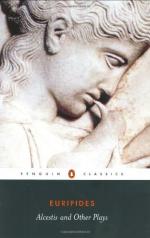|
This section contains 322 words (approx. 1 page at 400 words per page) |

|
Iphigenia in Taurus Summary & Study Guide Description
Iphigenia in Taurus Summary & Study Guide includes comprehensive information and analysis to help you understand the book. This study guide contains the following sections:
This detailed literature summary also contains Bibliography and a Free Quiz on Iphigenia in Taurus by Euripides.
To a modern audience, there is very little dramatic intensity in Iphigenia in Taurus. Those who hunger for action, deep emotion, or sharp irony may find this straightforward play "boring." Iphigenia in Taurus seems a strange combination of tragedy and romance because although tragic conditions precede the events of the play and tragic events nearly happen, no one dies or ends in misfortune in this play. The misfortunes plaguing both Orestes and Iphigenia already exist before the play begins and by the end they are freed of their problems with little effort. The characters talk about past or potential traumas, then neatly dismiss or avoid them. All of the dangerous action occurs offstage or outside of the events of the play itself Thus, in addition to its traditional classification as a tragedy, Iphigenia in Taurus has been called a "romantic melodrama."
But the play does meet Artistotle's definition of a work that releases pity and fear through exciting and then resolving these emotions (as a tragedy should). The prolonged scene wherein Orestes and Pylades refuse to reveal their identities to Iphigenia and she fails to reveal her own, allows a build up of pity and fear that are released when Iphigenia pronounces her brother's name. This moment of recognition constitutes one element that Aristotle considered key to tragedy: a reversal of situation and recognition.
Iphigenia in Taurus lacks the heightened sense of drama often associated with tragedies, yet it is not unworthy of study, for it opens up a window to the ancient Hellenic mind, which enjoyed the quiet contemplation of the ironies of expectation versus fulfillment. It is a play that explores the mirror image of what is commonly called tragedy: not the descent of a tragic figure but the rise from tragic fate by characters who sidestep human sacrifice and still achieve ritual purification. In that respect, Iphigenia in Taurus is a kind of ancient Greek "escape" literature.
Read more from the Study Guide
|
This section contains 322 words (approx. 1 page at 400 words per page) |

|



